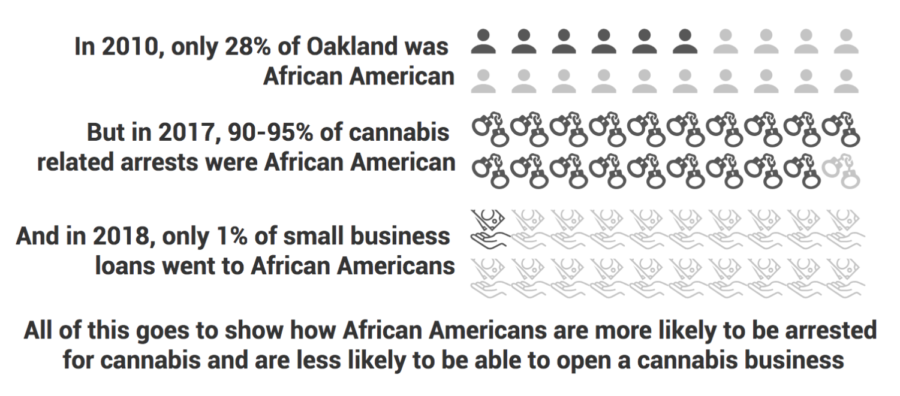Lack of diversity in the Bay Area cannabis business
Sources: Politico, the Census Bureau, the Hood Incubator (a POC-focused cannabis business accellerator). Infographic by Kian Nassre, Web Editor.
Since the legalization of recreational marijuana in January of 2018, the Bay Area community and economy have faced drastic changes in the cannabis industry. As more legal dispensaries open in San Francisco and around the Bay, issues emerge surrounding racial and economic diversity in the industry.
According to the San Francisco Chronicle, the majority of cannabis dispensaries are in the Tenderloin district. This clustering is largely due to San Francisco’s implementation of “buffer rules” that require dispensaries be located at least 1,000 feet from places that serve children, like schools and recreation sites. These zoning laws cause a concentration of marijuana dispensaries in so-called “green zones” — places with less resources available for children and families. The zoning guidelines cause extreme price increases in these “green zones” as the zones become filled, leading to an increasingly elite population that is able to purchase and open cannabis dispensaries in these approved areas.
Minority Cannabis Business Association (MCBA), a nonprofit founded in 2015, supports person-of-color owned and operated cannabis businesses across the United States. According to their website, MCBA’s goal is to “increase representation of minorities among cannabis business employees, owners and investors, improve cannabis perception and education among minority populations, and inform about cannabis access and medical consumption among minority populations.”
In addition to the MCBA, other organizations such as The Hood Incubator is attempting to promote racial diversity within the cannabis industry. Ebele Ifedigbo, Biseat Yawkal and Lanese Martin, three women from Oakland, CA, started The Hood Incubator in 2017 to train people of color in the Bay Area about owning and operating their own small businesses.
Clarke Weatherspoon, Urban’s Dean of Equity and Social Justice, said that the issue of diversity within cannabis dispensaries raises “broader ethical questions, because [to start] any business you need capital [and] some way to construct a customer base.” Weatherspoon added that, “[for] a lot of people who were [in] the underground marijuana economy,” it’s difficult to cross over from a once illegal business and “make that totally legal.”
According to Politico Magazine, The Hood Incubator’s mission is to “train black and brown people to start their own legal cannabis companies….as a way to correct the injustices of the war on drugs launched in the early 1970s.”
According to The Hood Incubator, 90-95 percent of all cannabis-related arrests in Oakland are of people of color. Compared to the bare one percent of loans that are given to black people across the country, the pattern is clear: it is less likely for white people to get arrested for possession of cannabis, but easier for them to open their own small business cannabis dispensaries. Ifedigbo added to Politico that “black people owned or founded less than five percent of cannabis businesses nationwide.”
Weatherspoon also added that anyone looking to get into the cannabis industry benefits from some prerequisites, such as having a solid economic standing. Being financially stable is imperative when going into the legal cannabis business, because “you need a storefront, you need a real estate agent who’s going to rent to you, you need a lot of the structures in place.” Weatherspoon added that having “connections through education [and] previous business experience” also lends itself to improving business ventures in cannabis. For those who were convicted of a crime and did jail time for a cannabis related offense, the cannabis industry has potential limitations for these people to return to upon their release, because they lack the pre-existing capital and connections.
Weatherspoon said another possible limitation for potential cannabis businesses comes from of the fact that marijuana is not legal across the United States, despite being legal in California. He added that, because marijuana has not been federally legalized, it is “still somewhat dangerous to be involved in. [People] can’t really put their money in banks because [the federal government] is not protecting that money.”
There is a clear pattern of discrimination against people of color in the marijuana industry, especially in regards to getting loans and real estate which are both vital elements of entrepreneurship. However, organizations like MCBA and The Hood Incubator are looking to make a difference and provide opportunities for more people of color to become involved in California’s $8 billion cannabis industry.


